
Why grants matter

A Physiotherapy Research Foundation Project Grant helped Dr Kevin Wernli investigate the relationship between movement, posture and activity in treating persistent low back pain. He talks to Marina Williams about his research.
The relationship between movement, posture and low back pain was the key topic for Dr Kevin Wernli APAM’s PhD.
With the support of a Physiotherapy Research Foundation Project Grant in 2017, Kevin’s research was aimed at ‘understanding the relationship between changes in movement, pain, activity limitation and psychological factors in persistent low back pain’ from both a quantitative and qualitative perspective.
Results were published in the European Journal of Pain in 2020 and 2022, with more publications under preparation.
He also presented the findings at the Australian Pain Society’s Annual Scientific Meeting in 2022 and received the award for Contribution as an Emergent Researcher at the 2022 APA Western Australian Branch Awards.
During the 22-week project that formed a key part of Kevin’s PhD research, participants with persistent, disabling low back pain were fitted with wearable sensors to measure how they performed their most challenging daily tasks, such as sitting, bending and lifting.
These tasks were measured almost weekly.
Pain, function and psychological factors were also measured and participants were treated with cognitive functional therapy, a new approach for persistent musculoskeletal pain conditions.
The $16,820 Project Grant helped fund the wearable sensor equipment and treatment.
Clinically, using an evidence-informed approach to the management of musculoskeletal pain enables Kevin to work with the patient to help them understand the variety of individual factors that are known to contribute to pain.
‘This type of “mind–body” approach aims to help people make sense of why they hurt, to provide them with practical strategies to help control their pain and to help address any lifestyle factors that may be relevant in their presentation, with the ultimate goal of empowering them to get back to living.’
Passionate about closing the evidence-to-practice gap, Kevin publishes infographics and videos and in 2020 co-hosted and produced the Empowered Beyond Pain podcast to make sure that evidence-based information reaches the public quickly and in an accessible format.
‘Research is vitally important and one of my biggest frustrations is research not being used in the real world or sitting behind a paywall.

Kevin Wernli.
'There is some literature from 2011 touting that the average time it takes for research findings to reach the clinical world is 17 years.
'I’m interested in using digital solutions to translate research and make health more effective and equitable.’
Kevin lectures at Curtin University, maintains a private practice clinical case load and is the co-founder of a digital health startup that helps people with endometriosis understand their condition and implement strategies to improve their symptoms.
His affinity for combining digital technology and storytelling stems from an early interest in film and TV.
‘I figured I could do some film and TV stuff on the side as a bit of a passion project but I couldn’t do any physio on the side without a degree, so I enrolled to study physio.’
He graduated from Curtin University in 2014. His interest in persistent pain stemmed from early clinical work.
‘I really enjoyed the persistent musculoskeletal, private practice-type presentations.
'To see the impact that you can have on someone and to change their trajectory when they’ve got chronic pain or persistent low back pain, or any pain condition, was very rewarding.
'About 80 per cent of us will experience low back pain at some stage in our lives and one in five have persistent pain.
'So I thought “How can I have the biggest impact here?”, which led me to do my PhD with a fantastic and highly skilled bunch of supervisors.’
These were Associate Professor Peter Kent, Professor Peter O’Sullivan FACP, Professor Anne Smith and Associate Professor Amity Campbell.
Applying for grants and securing funding is an essential part of research, he says.
‘Grants and publications are valuable currencies in the research world and grant writing is an important aspect of that.
'I’ve applied for lots of grants and each time I apply, I gain more clarity in my thinking.
'It’s a useful exercise, so be curious and consider how the Physiotherapy Research Foundation can support your journey to exciting and novel discoveries.’
© Copyright 2024 by Australian Physiotherapy Association. All rights reserved.





